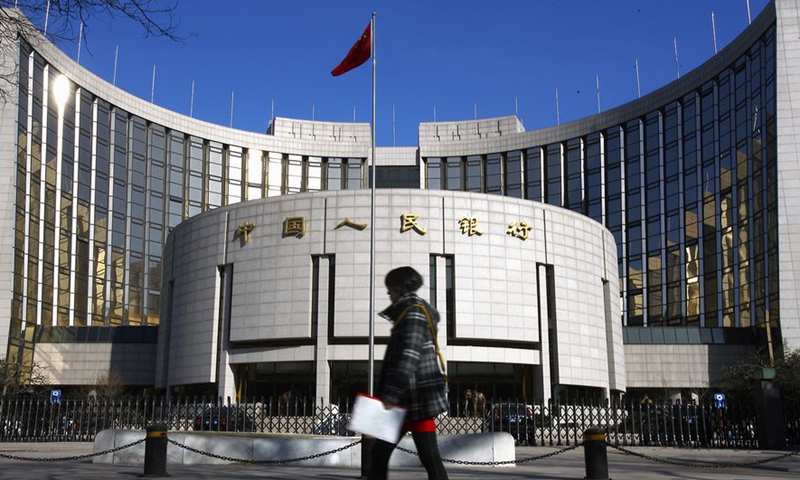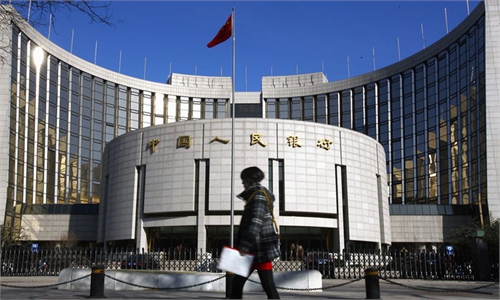
A file photo shows a pedestrian walks past the headquarters building of the People's Bank of China in Beijing, capital of China. (Xinhua)
Chinese officials are backing the passage of a financial stability law which will provide supervision mechanisms for all kinds of financial activities so as to protect the interests of the retail and smaller investors, and those who are insured, Yi Gang, governor of the People's Bank of China (PBC), said at a press conference on Friday.
The draft law stipulates the establishment of a working mechanism to maintain financial stability, the strengthening of the mechanism to prevent and defuse financial risks, the clarification of the division of responsibilities to handle financial risks, and improved response measures to financial risks.
China is likely to roll out the law on financial stability in 2023, Liu Guoqiang, vice governor of the PBC said in December, according to media reports.
It was submitted for its first reading to the 38th session of the Standing Committee of 13th National People's Congress (NPC), China's top legislature in December. In general, a draft becomes law after it is reviewed by the legislative body three times.
"The draft law provides a legal basis for the prevention and resolution for major financial risks, which will contribute to the improvement of China's financial safety and stabilize market expectations apparently," Wang Peng, a research fellow at the Beijing Academy of Social Sciences, told the Global Times on Friday.
By unifying "scattered" rules, the law will effectively solve a variety of challenges in maintaining the country's financial stability, for example, inadequacy in the cross-department working mechanism, ambiguity in the division of responsibilities among relevant government agencies, and insufficient risk disposal measures.
"Financial security is an important part of the country's national security, while maintaining financial security requires laws that prevent financial risks in advance. In this sense, the draft law can be seen as a prerequisite for ensuring the national security," Dong Dengxin, director of the Finance and Securities Institute of the Wuhan University of Science and Technology, told the Global Times on Friday.
As financial institutions in China are supervised by different government agencies according to their segregation of financial business, one important apsect of the draft law is building a cross-department response mechanism, Dong said.
Amid downward economic pressure in recent years, there have been some risks identified across the country's financial system, especially businesses related to the internet and real estate sectors, which are typical of cross-industry and cross-regional transaction models which are harder to identify, according to experts.
Dong Shaopeng, a senior research fellow at the Chongyang Institute for Financial Studies at Renmin University of China, told the Global Times that the draft law will help strengthen routine investigation of potential risks and illegal behaviors within financial institutions.
"Illegal and non-compliant activities within enterprises and financial institutions are malignant tumors in the financial sector," Dong said, urging strict crackdown on financial corruption for its long-term healthy development.
It's worth noting that a stability guarantee fund will be established, according to the draft law. Wang said the fund may work by lending to institutions faced with risks in order to increase their liquidity and protect consumers' interests.
The country's overall financial risk has been balanced out on the back of comtinued efforts to defuse financial risks by regulators, according to Yi. All of the countries top four banks are now considered global banks, with their financial strength topping the world. In addition, most of the country's joint-stock commercial and small- and medium-sized banks reported stable operations, while a small group of small- and medium-sized financial institutions have made important progess in reforms to dissolve risks, Yi said.
"The central bank will strengthen the system that ensures financial stability and guard the bottom line of no systemic financial risks," Yi said.

